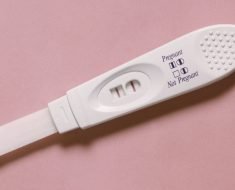By now, you probably know that it’s not a good idea to gain 20+ kilograms while you’re pregnant. But is it ever okay to lose weight when you’re pregnant?
While the American College of Obstetricians and Gynecologists (ACOG) says it’s fine to work out when you’re pregnant (provided you don’t do anything too strenuous or with a high risk of falling), Michael Cackovic, M.D., a maternal-fetal medicine physician at The Ohio State University Wexner Medical Center, says it’s not really a good idea to try to actively lose weight when you’re carrying a baby.
He points to ACOG guidelines that state that women across all BMIs are encouraged to gain some weight during pregnancy. Women who have a “normal” BMI are encouraged to gain 10 to 20 kilograms, those who are overweight 8 to 15 kilograms, and those who are obese 5 to 10 kilograms.
If You’re Overweight Or Obese
That being said, obesity increases a woman’s risk of having a miscarriage, stillbirth, and various pregnancy-related health complications like preeclampsia, says Cackovic.
But even if your BMI is above the normal range for women, actively trying to lose weight during pregnancy—especially by following a restrictive diet for weight loss’ sake—really isn’t smart, Cackovic says. That’s because when your body goes into “starvation mode,” (as it does when you reduce calories dramatically) it creates carbon fragments from your liver called ketones, which supply you with energy when you’re not taking in enough calories. But those ketones, which have been linked with brain damage in babies, can cross the placental barrier and reach the fetus.
“We do limit obese women’s weight gain, but there’s never really an instance where we recommend weight loss,” says Sherry Ross, M.D., an ob-gyn and women’s health expert at Providence Saint John’s Health Center in Santa Monica, California.
However, people who are obese may end up losing some weight during pregnancy by following a healthier, more nutrient-rich diet, she says. “Obese women who are eating much more healthy in general during their pregnancy may have a hard time gaining weight,” says Ross.
Obese or overweight women who are diagnosed with gestational diabetes, a form of high blood sugar that impacts pregnant women, might also be put on a strict eating plan by their doctor to try to modify their blood sugar, says Cackovic. And this could also lead to weight loss or at least a plateau in weight gain, he says.
If you fall into this BMI range and want to reduce your risk of weight-related pregnancy complications, it’s best to talk to your doctor before making any big changes to your diet or exercise plan during pregnancy, says Cackovic.
If You’re Not Overweight
If you’re actively trying to lose weight after you become pregnant, that’s a red flag that you may be suffering from an eating disorder, says Jessica Shepherd, M.D., an assistant professor of clinical obstetrics and gynecology and director of Minimally Invasive Gynecology at the University of Illinois College of Medicine at Chicago. “Weight gain is expected in pregnancy—weight loss is not the expectation,” she says. Talk to your doctor about your concerns—he or she should be able to help address them and may refer you to a specialist for help.
And if you’re a fitness fiend who just wants pregnancy “abs” (like Australian model Chontel Duncan), Cackovic says it’s better to make healthy changes before you get pregnant and keep up with your healthy lifestyle post-baby bump. But you should still plan to gain the amount of weight recommended by your doctor, or you may be putting your unborn child at risk.
Bottom line: “The only way you can create a strong and healthy placenta for your baby is by consistently eating a healthy and nutrient-rich diet,” Ross says. In other words, hold off on your slim-down plans until the baby vacates the premises.
This article originally appeared on Women’s Health US.
Source: Read Full Article





